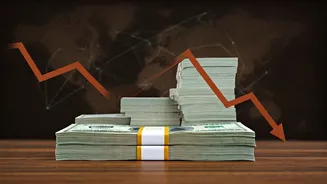Dollar's Weakening Position
The dollar encountered a setback on Friday, influenced by the ongoing global trade disagreements and signs of a weakening U.S. economy, which reinforced
the likelihood of the Federal Reserve implementing additional rate cuts. In contrast to the Japanese yen, the dollar's value decreased by 0.2%, settling at 150.12. BOJ Governor Ueda, during his Thursday address in Washington, expressed the central bank's readiness to potentially increase its key policy rate should there be a heightened likelihood of their growth and price forecasts materializing. Moreover, the Federal Reserve's Beige Book offered limited support to U.S. rates, hinting at emerging signs of economic weakness, including rising layoffs and reduced spending among middle and lower-income households. The dollar index, which assesses the greenback's performance against a selection of currencies, remained relatively stable at 98.23 but was on track for a 0.6% decline this week, marking its most significant five-day retreat since late July.
Trade Tensions Impact
Trade disputes between Beijing and Washington intensified overnight, with China accusing the U.S. of generating panic over its rare earth controls and rejecting a White House call to relax the curbs. These trade frictions, marked by accusations and counter-accusations, played a role in the dollar's performance. The concerns surrounding global trade have weighed on the dollar's value. The situation created uncertainty in financial markets. The response from both countries will influence the future direction of trade relations and will further influence the strength of the dollar and other currencies. The escalating trade battles, with their potential to affect global supply chains and economic growth, created a climate of caution among investors, pushing them towards safer investment options, and putting downward pressure on the dollar.
Central Bank Actions
The actions and statements of central banks, particularly the Federal Reserve and the Bank of Japan, have become vital in shaping currency values. Fed Governor Christopher Waller conveyed his support for another interest rate cut at the U.S. central bank's meeting later in the month, considering the mixed readings on the job market's state. Stephen Miran, the newest Fed governor and an economic advisor to U.S. President Donald Trump, reiterated backing for more aggressive rate cuts at forthcoming meetings than some of his colleagues favored. These statements indicated the potential for further monetary easing. BOJ Governor Ueda's comments, indicating the bank's readiness to increase its key policy rate, reflect the balancing act central banks are performing amidst economic uncertainties. These monetary policies and the economic data will steer the course of currency valuations.





















